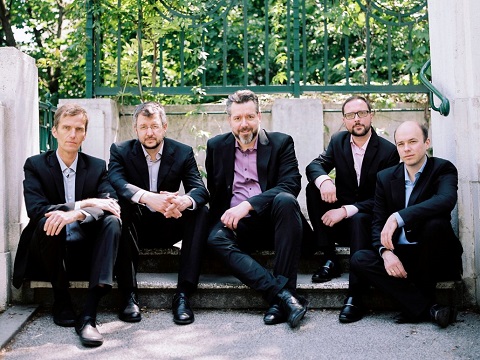We don’t know for certain if Richafort wrote his six-voice Missa pro
defunctis as a memorial to Josquin, upon the latter’s death in
1521. But, it’s a tempting and not unlikely notion, given the Mass’s
numerous allusions - explicit and assimilated - to compositions by Josquin.
It had been thought that Richafort was one of Josquin’s pupils, though some
scholars now argue that it would be more appropriate to consider them as
belonging to the same artistic ‘school’.
Indeed, the programme was a palimpsest of cross-references and
self-quotations. Richafort’s Mass quotes from the six-voice motet,
‘Nymphes, nappés’, which is itself based on the antiphon ‘Circumdederunt me
gemitus mortis’ - the chant that Richafort introduces in canon form into
each movement of the Mass. In addition, the Gradual and Offertory quote a
melody setting the phrase, ‘C’est douleur non pareille’, also in two-voice
canon, drawn from Josquin’s five-voice chanson ‘Faulte d’argent.
The five members of Cinquecento were joined by tenor Nicholas Todd for
their performance of Richafort’s Mass, which was characterised by magnitude
of expression and depth of feeling. In the Introitus, the lines extended
seamlessly, seemingly sung in one unbroken breath. Individual voices were
at times brought to the fore, to point a melodic elaboration or emphasise a
dissonance arising, sometimes unexpectedly, from the collision of
polyphonic lines. Often there was a sense of a gradual ‘freeing’ of the
sound as movements progressed, the ensemble tone grounded by the tender
bass of Austrian Ulfried Staber. Despite Wigmore Hall’s fine resonance,
occasionally I longed for a cathedral acoustic which would lift, swell and
swirl the sound in an embracing sweep. Cadences were finely graded, often
‘coming to rest’ with gentleness after the blossoming explorations, a
soothing relaxation after the engendered tension. In the Graduale, there
was a wonderfully reverential diminishment, ‘Non timebo mala, quoniam tu
mecum es, Domine’ (I shall not fear evil, for you are with me, Lord); then,
a flowering, the graceful unfolding of a bud’s petals, at the close of this
movement: ‘Virga tua et baculus tuus, ipsa me consolata sung’ (Your rod and
your staff, they comfort me). Throughout, Cinquecento demonstrated superb
control and grading of dynamics.
Paradoxically, within the homogenous idiom in which all lines are bound to
the cantus firmus which is deeply and almost inextricably embedded within
the dense polyphony, there were striking contrasts. In the Offertorium, the
quiet opening line of chant, ‘Domine Jesu Christe’, was followed by a blaze
of rejoicing, ‘Rex gloriae’. Strange dissonances at the end of movement -
‘Fac eas, Domine, de morte transire ad vitam sanctam’ (allow them, Lord, to
cross from death into holy life) -were eased and salved in the concluding
phrase, ‘Quam olim Abrahae promisisti/Et semini eius’ (as long ago you
promised Abraham and his seed). The ‘Sanctus’ was vigorous and purposeful,
while in the Agnus Dei Cinquecento produced an elevated tone, sinking low
and hushed as if in humility with the closing plea for eternal rest.
The two works by Josquin which are quoted by Richafort were interleaved
between the movements of the Mass in the first part of the concert.
‘Nymphes, nappés’ was fittingly melancholy yet euphonious while harmonic,
rhythmic and textural restlessness characterised ‘Faulte d’argent’.
Flexibility and naturalness of utterance were also noteworthy in the Stabat
mater for five voices which opened the second half of the concert: again,
the expressiveness of the cadential dissonances was striking, as the
flattening of the mode in the penultimate ‘Paradisi gloria’ evened into two
repeated chords: ‘Amen’. Countertenor Terry Wey’s declarative ‘Inviolata’
at the opening of the eponymous five-voice motet, was followed by the
flowing colour of the homage to Mary ‘whole and chaste’ (‘integra et
casta’); such details offered the listener rich pathways to the deep
sentiments of Josquin’s texts.
Alongside the works by Josquin and Richafort, we heard Benedictus
Appenzeller’s interesting ‘Musae Jovis’ á 4, an elaborate unfolding of
grief, always poised and controlled. After the pianissimo resignation,
‘Josquinus ille occidit’ (Josquin himself is dead), ‘harsh death’ (Severa
mors] was assertively challenged, and there was bitterness in the final
complaint against the unjust reaper who had carried off the good, sparing
the evil. Interwoven through the programme were various Gregorian chants
which were sung with clarity and dignity, sometimes moving from a solo
voice to a persuasively blended unison. Belgian tenor Tore Tom
Denys introduced ‘Absolve, Domine’, which subsequently warmed into a
soothing blend of subtly nuanced lyricism.
The closing item saw Josquin himself looking back and lamenting the passing
of an illustrious predecessor, Johannes Ockeghem. His ‘Déploration sur la
mort d’Ockeghem’ draws on both Josquin’s own lamenting chanson, ‘Nymphes
des bois’, and the Introitus Requiem aeternam of Ockeghem's Missa pro
Defunctis. After the vigorous interplay of independent voices, the final
line - ‘Requiescat in pace. Amen.’ - indeed brought peace, Cinquecento’s lovely sonority, here and throughout the
performance, speaking of things both heavenly and human.
Claire Seymour
Josquin des Prez and his legacy
Cinquecento
(Terry Whey, countertenor; Achim Schulz, tenor; Tore Tom Denys, tenor; Tim
Scott Whiteley, baritone; Ulfried Staber, bass); Nicholas Todd, tenor.
Gregorian Chant - Circumdederunt me; Jean Richafort - Requiem a 6; Josquin
des Prez - ‘Nymphes, nappés’ a 6; Gregorian Chant - De profundis; Josquin
des Prez - ‘Faulte d’argent’; Gregorian Chant - ‘Absolve, Domine’;
Benedictus Appenzeller - ‘Musae Iovis’ a 4; Josquin des Prez - Stabat
mater, ‘Inviolata’ a 5; Gregorian Chant - Libera me; Josquin des Prez -
‘Nymphes des bois’ or (Déploration sur la mort d'Ockeghem).
Wigmore Hall, London; Friday 7th June 2019.
